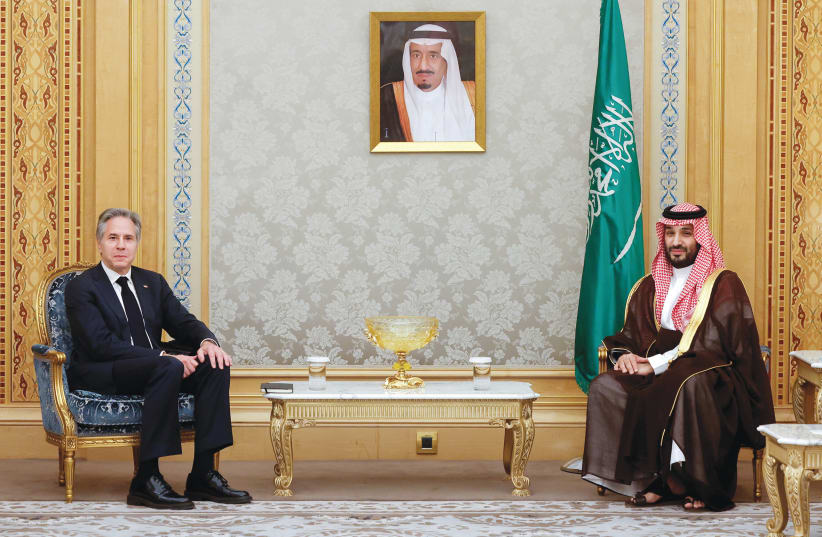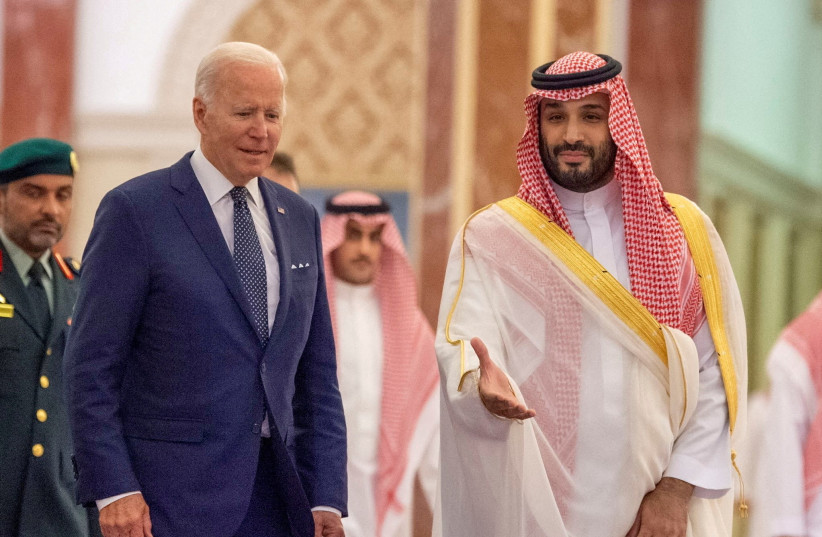Leading up to October 7, the United States and Saudi Arabia have advanced discourse of a broad regional deal centered on a defense alliance; sales of integrated military equipment; a civilian nuclear program; normalization with Israel; and benefits for the Palestinians.
Since the beginning of the war in Gaza, the normalization aspect and the Palestinian component have been linked to a complete ceasefire and reconstruction of Gaza, and the fate of the bilateral components between the US and the kingdom remained uncertain – until significant progress has been made in recent weeks.
Despite that, it can be thought that Israel is an extremely secondary player in a broad transaction, in which Washington appears to be extending favor to Jerusalem by proposing “a new era” in the Middle East.
Israel’s place in the triad deal constitutes a significant bottleneck, and the American initiative is far from an altruistic gesture but rather serves a paramount interest. With the upcoming US elections creating a narrow window of opportunity, the Israeli government’s inaction places Jerusalem in a dangerous spot that could lead to increased American pressure, further destabilizing its already precarious standing on the global stage.
Amid Biden’s aspiration to score a strategic achievement in an election year, the looming threat from Iran and the imperative to isolate Russia due to its actions in Ukraine, it is crucial to underscore that the primary American interest in the Saudi deal stems from apprehensions regarding Riyadh’s ties with Beijing – Washington’s strategic rival which strives to expand its influence in the Middle East.
Under the leadership of President Xi, China has been working for many years to expand its investments in the world, forging extensive economic ties with Saudi Arabia. As the world’s largest importer of oil, China acquires approximately a quarter of Saudi Arabia’s oil exports, more than any other country. Just 18 months ago, as part of an honors meeting with Crown Prince Mohammed bin Salman (MBS), 34 deals were signed across various sectors, amounting to a total value of $30 billion. Saudi Arabia, as part of its “2030 Vision,” is actively pursuing diversification of its income sources to mitigate heavy reliance on oil sales, particularly with the anticipated decline in oil demand in the forthcoming decades, due to the global transition toward renewable energies.
Consequently, cooperation between Riyadh and Beijing may be expressed in Chinese aid for the development of the future metropolis “Neom,” MBS’s flagship project, estimated to cost hundreds of billions of dollars.
The recent renewal of relations between Saudi Arabia and Iran, brokered by China in March 2023, has underscored to the US the potential threat to its longstanding partnership with the kingdom, historically considered to be its main partner in the Gulf.
Consequently, over the past year, the Biden administration has changed its approach, adopting a more pragmatic stance that scrutinizes Saudi actions that were perceived as deliberate attempts to politically harm the president, such as cutting Saudi oil production at the beginning of the Russian invasion of Ukraine. As part of the mega-deal that is being rapidly promoted these days, the US seeks guarantees from Saudi Arabia to keep a “safe distance” from economic, technological, and military collaborations with China that would endanger American interests.
Israel's leverage over the Biden administration
WHILE IT may be easy to perceive Israel as having a marginal role in the US-Saudi mega deal, I believe that Israel holds considerable leverage over the Biden administration, which could seriously harm it if it doesn’t use it wisely. This is in light of the requirement to secure Senate approval for the proposed agreement and the defense alliance between the US and Saudi Arabia, necessitating a two-thirds majority (67 senators). In other words, the Democratic administration must garner support from at least 17 Republican senators to achieve its “overarching goal,” defined by National Security Adviser Jake Sullivan.
However, Senator Lindsey Graham has reiterated Republicans’ stance that they won’t support the US-Saudi pact without normalization and security assurances for Israel in the Palestinian context.
Additionally, the Biden administration may need tangible achievements on the Palestinian issue – which depend on Israel – to secure support from Democratic senators, particularly those in the progressive wing. This becomes crucial in providing American permutations to Saudi Arabia, which is still suffering from hostility in Congress, in light of human rights violations by the kingdom.
The American push for a trilateral agreement and the desire to reduce Chinese economic influence places Israel at a pivotal juncture, where it must act wisely and carefully. On the one hand, Jerusalem finds itself in a position of leverage over Washington and has greater maneuverability than before in terms of shaping exchanges for the Palestinians.
On the other hand, it’s likely that as the election date gets closer and the window for promoting a comprehensive deal narrows, the Biden administration will intensify pressure on Israel and mitigate potential damage to its image resulting from the failure of negotiations.
This delicate balance demands prudent management by the Israeli government, and any reluctance to advance the issue even under different conditions, constitutes a risky gamble.
The sequence of recent actions of the US administration has proven that Washington has no hesitation in pushing its closest ally into a corner. Publicly blaming Israel for the breakdown of negotiations doesn’t sound like an unreasonable step, and this will significantly damage already tense relations US-Israel relations and exacerbate Jerusalem’s deteriorating international standing.
The writer has nearly a decade of experience as a Middle East analyst in Israel. Currently in his fourth and final year of pursuing a degree in law (LLB) and government (BA) at Reichman University, he is a fellow of the Argov Fellowship in Leadership and Diplomacy.

